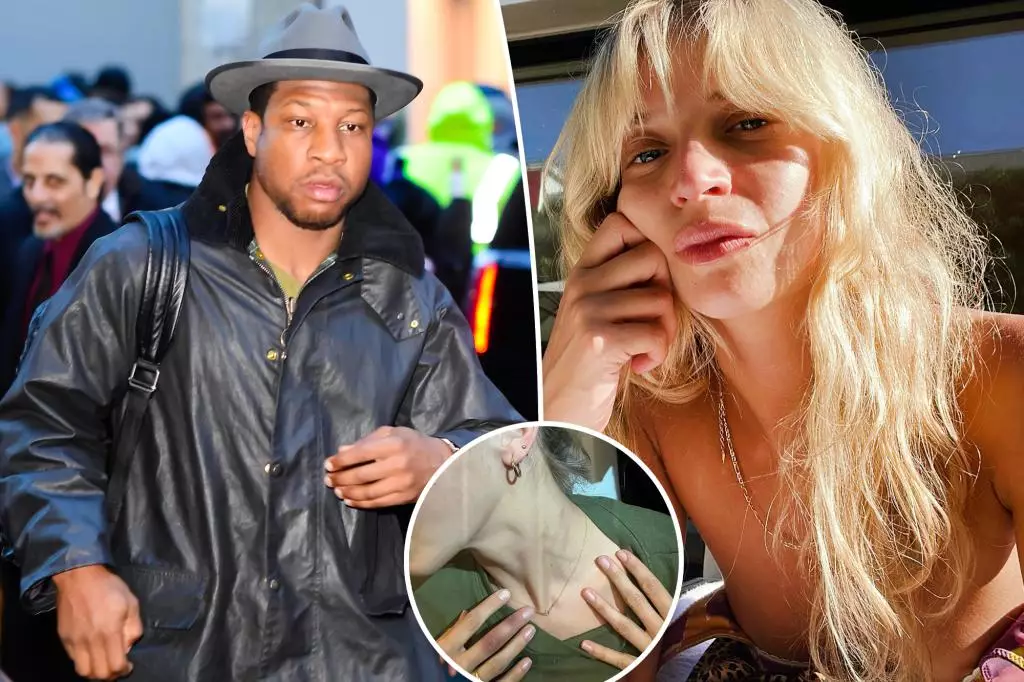The case surrounding Jonathan Majors and his ex-girlfriend Grace Jabbari is an intricate tapestry of emotions, public scrutiny, and the consequences of personal choices. Since their relationship began in 2021 and culminated in a stormy breakup marked by conflict, Majors’ recent admission, released in audio footage, underscores a deeply troubling narrative of violence and regret. The actor, known for his roles in “Creed III” and “Lovecraft Country,” stated, “I’ve never been aggressive with a woman before. I’ve never aggressed a woman — I aggressed you.” This revelation starkly contrasts with his public persona, presenting a man grappling with the fallout of his actions.
The recorded conversation dives into the aftermath of incidents that, while personal, have implications that resonate through the media and societal perceptions regarding domestic violence. Jabbari’s challenge of Majors’ violent outburst, where she recounted being choked and pushed, raises critical questions not only about individual accountability but also the societal failure to address such issues head-on. The exchange between the two highlights an alarming cycle of emotional and physical violence—issues that too often remain shrouded in silence.
The Landscape of Accountability: Legal Repercussions and Public Image
Following the March 2023 incident, the legal ramifications began to unfold. Majors was convicted of assault and harassment, showcasing a troubling disconnect between the glamor of celebrity status and the weight of legal accountability. While he avoided jail time, his sentence of probation and mandated participation in a domestic violence intervention program suggests a recognition of the magnitude of his actions. His ability to sidestep serious punishment is not only indicative of the complexities of the legal system but also highlights potential disparities in how such cases are handled concerning public figures.
However, the recent legal developments do not end with Majors’ criminal conviction. Jabbari’s subsequent lawsuit, alleging defamation and physical assault, indicates that the ramifications of their relationship continue to evolve. The assertion that she was subjected to violent behavior—including being physically restrained and having her head struck against a hard surface—paints a vivid picture of the experience of victims in situations of domestic abuse. The prolonged aftermath of such trauma casts a long shadow on both parties involved, complicating the path towards any semblance of healing.
Echoes of Trauma: The Cycle of Abuse and Reformation
This incident not only illuminates personal tragedy but also resonates on a broader societal scale regarding the treatment of men in the context of domestic issues. Majors’ candid admission of having been a victim of sexual abuse himself complicates the narrative further. His revelations point to a cycle of pain where those who experience trauma may inadvertence become perpetrators themselves. This ongoing cycle raises critical questions around mental health, emotional wellness, and the societal frameworks that allow for such patterns to persist unanswered.
In the world of entertainment, where charisma often masks deeper troubles, the redemption arc of a celebrity can be both a destructive and constructive force. While Majors’ engagement to actress Meagan Good hints at attempts to rebuild aspects of his life, the societal expectation that he should be given a second chance is met with skepticism. As the public discourse shifts, it begs a reexamination of the conditions under which we offer forgiveness. It forces us to contemplate: What does true accountability look like when intertwined with fame?
The Future of Celebrity and Justice
The ongoing saga of Jonathan Majors and Grace Jabbari serves as a reminder of the frail boundary between public perception and private conduct. As celebrities navigate their turbulent personal lives in the glaring light of media scrutiny, society must grapple with its role in either perpetuating or dismantling this cycle. In a world where voices often go unheard, the responsibility lies on individuals to advocate for change, whether through legal frameworks, mental health awareness, or community support systems.
What’s crucial is that the dialogue around domestic violence remains vocal and uninhibited, pushing the boundaries of shame and stigma attached to victims. Highlighting these issues fosters an environment conducive to awareness and helps reduce future occurrences of abuse. Jonathan Majors represents not just a single, tumultuous narrative but symbolizes the larger issues that society continues to face when it comes to power dynamics, pain, and the road to recovery.

